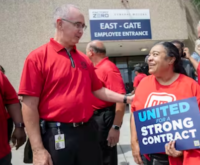By Elizabeth Whitehead
U S News, March 30, 2018 —
Corporate recruiters and career specialists at MBA programs offer inside tips for landing great jobs.
You excelled in college and now you’ve made it into a leading MBA program. The future looks rosy for a great job with a big multinational or a hot startup, right? Well, maybe.
The truth is employers want more than a slick resume and a top class ranking. They are looking for highly engaged applicants who have done their homework and know how to communicate.
During your job search, “treat every interaction with thought and importance,” says Jessica Wessely, who led MBA recruiting for JPMorgan Chase last year. Recruiters “have a limited amount of time to get to know people, so students need to make sure that every interaction is productive for their recruiting success.”

Don’t get derailed by a difficult interview. You need positivity, resilience and grit to ultimately get the job you want. (PhotoAlto/Odilon Dimier/Getty Images)
U.S. News reached out to corporate recruiters as well as career specialists at major MBA programs to get their inside tips for getting an inside track.
Naomi Sanchez, assistant dean, MBA career management, University of Washington Foster School of Business
Build your interviewing chops: One thing we emphasize is not getting derailed by a difficult interview. I’ve had students who’ve been told their answers are not good. Don’t lose your composure. Continue trying to respond in a positive manner. Engage with the interviewer.
You can ask back, “Did I answer your question?” Try to build that emotional connection even if they don’t want to be connected. Finish strong. You need positivity, resilience and grit to ultimately get the job you want.
Bonus tip: It’s easy to get attached to a location where you live or have family. But we encourage people to take advantage of international opportunities, like one former student who is now starting his career working in Amazon Japan.
Some students love Seattle – it’s a happening place – so they may start here and then go abroad. But students should keep in mind that living abroad is very much a part of leadership development now for most multinational companies. If you’re going to go to the C-suite, you will need that experience.
Kristina Liphardt, Americas campus recruiting leader for MBA recruiting, EY
Show you can “team”: One component of our interview day is having candidates sit in a room, and we give them an actual business scenario to solve while they’re observed. We’ve had instances where someone will have interviewed really well till that point, then they get to this exercise, and they will either rise or fall based on how they do.
Maybe someone will sit back and be very quiet, and you will see others say to that person, “Hey, do you have any ideas you want to contribute?” Another candidate might suggest a way to solve the case, and a team member might say, “Oh no, that’s a bad idea.” In consulting you have to team well, so you need to demonstrate these skills to get hired.
Bonus tip: The people who do well are authentic and not afraid to share their experiences honestly. We had an applicant turn us down for an internship and then come back a year later wanting to interview for a full-time position.
We asked, “What’s different now?” The candidate explained about not having been sure consulting was the right fit and having taken another internship, only later realizing that had been a mistake. The candidate just seemed very sincere and had done so much research on EY, the opportunity and who they were interviewing with that we made an offer.
Jason Oliver, vice president – talent acquisition, AT&T
Show how you will add value: It’s critical to show how you will add value as an employee. Recently, one of our college recruiters interviewed an MBA student who didn’t seem to have a solid sense of AT&T’s position in the marketplace – overall strategy, recent M&A activity and so forth. Instead, the student seemed more focused on “How much will I make?” or “What is the promotion timeline for new hires?”
She proceeded to walk through a one-page document that laid out her proposal in detail. The impressive component wasn’t the proposal per se – it was the fact that she came prepared, felt comfortable pitching her idea, and was passionate about driving our business forward.
Bonus tip: Increasingly, we partner with social platforms to target graduate business students. Through these connections, students can talk to members of the recruiting team and various leaders from across the business to learn more about our careers. Be on the lookout and leap at these interactive opportunities – we’re hiring a lot of people through this channel.
Jessica Wessely, technology investment banking business manager, JPMorgan Chase
Start your job search early: We typically begin preidentifying job candidates in April and May – before students enter business school in the fall. We partner with organizations like Toigo, MLT – Management Leadership for Tomorrow – and Forté to host early industry insight conferences.
We also put on events and competitions throughout the year at different schools. For example, at NYU Stern we have an annual investment banking case competition. We take a group of about 100 students, break them into groups and send them off to work on a case study, like a merger or acquisition.
The next day each team presents the findings to a group of managing directors from JPMorgan Chase. Students who have banking or financial clubs at their schools should sign up for those because they’re a great way of finding out what the financial companies are going to be doing.
Karen Heise, interim director, Weston Career Center, Washington University in St. Louis Olin Business School
Stick around after company events: One mistake I see is that students go to an employer-sponsored event but leave without talking to anyone.
Most recruiters or company reps stay after the presentation – sometimes for a half hour so people can walk up to them and get to know them personally. Then the student has a business card and connection he or she can use later: “I met so-and-so at your event on campus last month … .” These relationships can be so important later when applying for a job.
Michelle Hopping,director, Wharton MBA career management, University of Pennsylvania Wharton School
Cultivate your champions: Developing a conversation over time with company recruiters or reps can pay off. Look for reasons to contact them again that can reflect the skills and value you bring to the table.
The idea is you create a relationship. You want to develop advocates who will pound the table for you in a group when people are looked at for a potential internship or for a full-time job.
Allison Fether, vice president, human resources, IBM
Dress for success: Culture plays a big role in recruiting. We want to see if applicants fit into the “new IBM.” If we tell you to wear business casual, don’t show up in a three-piece suit. Folks have even shown up in suits with the tags still on, while the interviewer is wearing jeans and a T-shirt. We always say, “If you’re uncertain about something, ask your recruiter.”
Bonus tip: Sitting in an airport, I once heard a candidate talking on a cellphone about an IBM interview experience and saying how great it went. But then that person also made critical comments about an interviewer’s hairdo, things of that nature. The applicant had no idea that I was nearby and employed by IBM. You never know who might hear you, so save your interview reflections for when you have a private space.
Sjoerd Gehring, VP, talent acquisition and employee experience, Johnson & Johnson
Sell yourself in a 360-degree perspective: We’re starting to see more MBA students designing portfolios, not just a resume but a much more creative and holistic portfolio around who they are as a leader, their academic background, skills and experiences.
Recently I interviewed a student with a digital marketing background. She came into the interview with a beautiful portfolio of everything that she had done to date. She ran me through two digital marketing and digital ad campaigns she had supported for clients. She explained her role on the team, the creative campaigns they came up with, the media outlets that they had targeted and their results.
She was able to bring her experience to life. Portfolios aren’t just for designers; they can be effective for many candidates.
Bonus tip: Do not apply to 50 positions. If you are really interested in a role at J&J, then surely you will take the time to make sure your passions and skills align well to us and the position. By playing the quantity game you’re not conveying that “This is the company I really want to work for.”
This story is excerpted from the U.S. News “Best Business Schools 2019” guidebook, which features in-depth articles, rankings and data.












